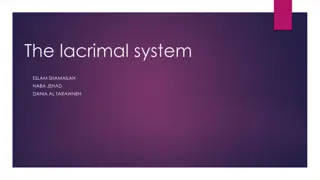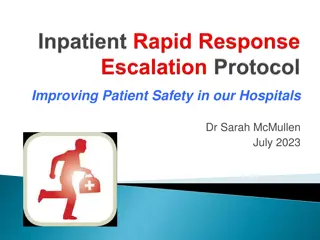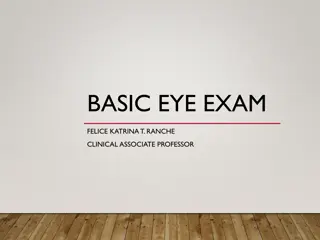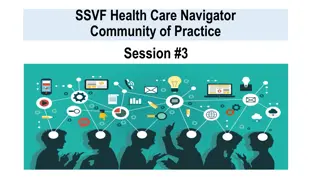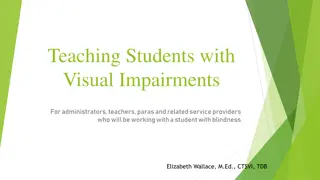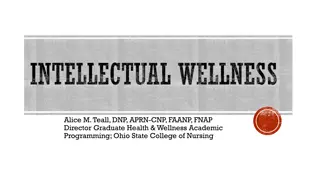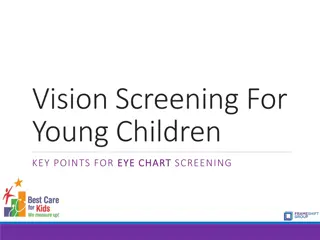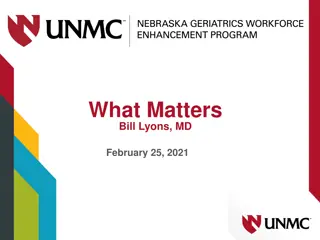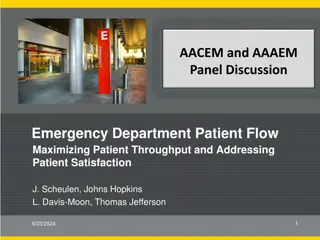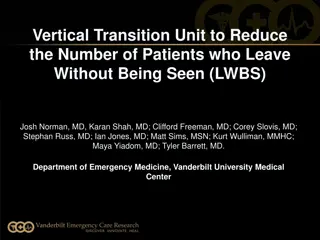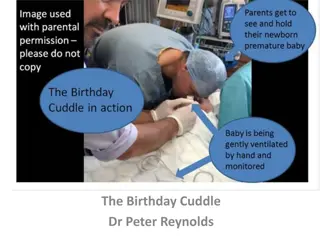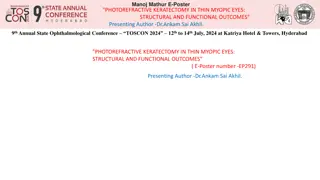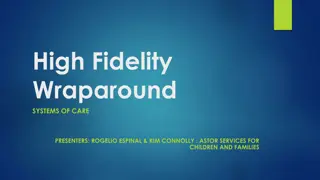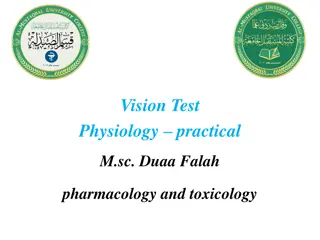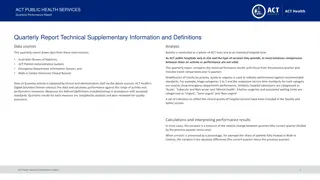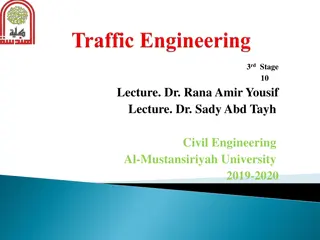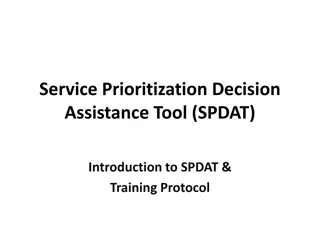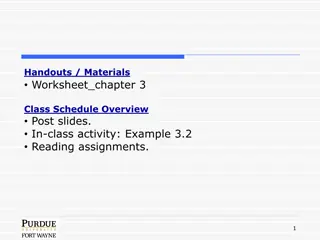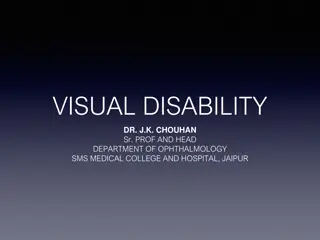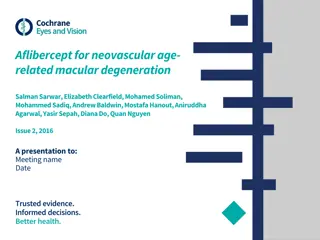Evolution of Robotic Surgery: Improving Surgical Precision and Efficiency
Robotic Assisted Surgery (RAS) has revolutionized the field of surgery by enhancing visual acuity, mobility, and reducing cognitive workload. The da Vinci Surgical System is at the forefront, offering high-definition imaging, immersive environments, and intuitive movements for better patient outcome
1 views • 19 slides
The lacrimal system
Disorders of the lacrimal system can lead to chronic symptoms affecting the eyes, causing discomfort and vision problems. Common abnormalities include dry eye, which can result from tear flow and evaporation issues. Aqueous-deficient dry eye, often associated with Sjögren's syndrome, is characteriz
3 views • 38 slides
Improving Patient Safety in our Hospitals
Dr. Sarah McMullen discusses the importance of early recognition and treatment of clinical deterioration in hospital settings to improve patient outcomes. Key points include identifying abnormal clinical antecedents, implementing early warning systems like NEWS2 and CHEWS, screening patients for cri
3 views • 35 slides
Essential Factors for Optimal Lighting in Work Environments
Good lighting plays a crucial role in maintaining eye health and ensuring efficient vision. Factors such as sufficiency, uniform distribution, absence of glare and sharp shadows, steadiness, and appropriate light color are key considerations for creating a conducive work environment. Striving for op
0 views • 24 slides
Basic Eye Exam and Visual Acuity Assessment - A Comprehensive Guide
Learn about the 5-point eye exam covering visual acuity, gross examination, motility, intraocular pressure, and funduscopy. Understand how to assess visual acuity at different distances, use the Snellen chart, and manage patients with poor vision. Explore techniques for evaluating near vision in pat
2 views • 17 slides
Understanding Prioritization and Barriers to Care in Health Care Navigation Practice
In this session of the SSVF Health Care Navigator Community of Practice, participants discussed the anticipated caseload size, plan for prioritizing veterans for health care navigation services, messaging strategies, and additional resources for support. Barriers to care such as age, lack of support
1 views • 55 slides
Evolving Regulation in Social Housing Sector - Insights from Acuity Conference
This presentation delves into the changing landscape of regulations in the social housing sector, highlighting key aspects such as rent regulation, consumer protection, risk profiles, and recent developments like funding changes and upcoming challenges. Emphasis is placed on adapting to sector risks
5 views • 16 slides
Understanding Visual Impairments and Visual Skills in Students
Exploring the world of visual impairments, this resource delves into how individuals with blindness use their vision, the importance of visual acuity and field, and visual motor abilities. From driving to playing sports, the use of vision is crucial, with visual acuity determining clarity of sight a
3 views • 23 slides
GP-CPCS Consultation Service Overview in Norfolk & Suffolk
Gain insights into the GP-CPCS service rollout in Norfolk & Waveney, East and West Suffolk. Understand Annex F payment claiming, criteria fulfillment, evidence collection, and available resources. Discover the benefits of GP-CPCS, referral pathways, and the role of community pharmacists in addressin
0 views • 23 slides
Enhancing Your Intellectual Wellness: Tips and Benefits
Understanding and promoting intellectual wellness is crucial for lifelong learning, critical thinking, and personal growth. This article presents insights into intellectual wellness, its importance, signs of being intellectually unwell, steps to improve it, and engaging challenges to boost your cogn
0 views • 8 slides
Importance of Vision Screening for Young Children
Understanding the critical development of vision in young children is crucial, as vision conditions can go undetected but have significant impacts. Early screening helps in identifying refractive errors, amblyopia, and strabismus for successful treatment. Prevalence statistics highlight the importan
0 views • 23 slides
Gender Disparity in Wine Judging: Insights from Wines of Portugal Challenge
Recent research delves into the question of whether male and female judges assign similar ratings to wines, and the implications of gender balance in wine competition judging panels. The study, which involved over 1,300 wines judged by panels with a mix of male and female judges, found minimal diffe
0 views • 4 slides
Prioritizing What Matters in Healthcare: A Comprehensive Approach
Focusing on what truly matters in healthcare involves aligning care goals, optimizing medications, maintaining mobility, promoting mental acuity, and fostering collaboration. Advance care planning, identifying patient priorities, and eliciting what matters are crucial components for enhancing patien
0 views • 26 slides
Update in Liver and Intestine Allocation Policies for Spring 2019
The recent updates in liver and intestine allocation policies for Spring 2019 include eliminating region and DSA from the allocation model, prioritizing medical urgency and proximity, enhancing pediatric candidate considerations, and adjusting weights for DCD and elderly donors. Acuity Circles Alloc
0 views • 15 slides
Acuity STAR User Training Overview
Acuity STAR User Training provides an introduction to the features of the STAR Portal, access guidance, data grid usage, report generation, and more. It aims to equip Member Secretaries with essential knowledge for utilizing the STAR application efficiently. Learn about STAR's purpose, mandatory fie
0 views • 17 slides
Acuity STAR User Training Overview
This comprehensive training guide covers everything you need to know about Acuity STAR, designed for faculty members and member secretaries. Explore topics such as accessing STAR remotely, navigating the STAR portal, logging in, understanding the landing page, managing Acuity STAR views, utilizing d
0 views • 20 slides
Maximizing Emergency Department Patient Flow and Addressing Patient Satisfaction in Panel Discussion
Expert panelists discuss strategies for enhancing patient throughput and satisfaction in emergency departments, covering topics such as care on arrival, low-acuity patient redirection, front-end operational changes, and simulation modeling of ED operations. The discussion also delves into drivers af
0 views • 14 slides
Strategies for Reducing LWBS Rates in Emergency Departments
In this study conducted at Vanderbilt University Medical Center, a Vertical Transition Unit (VTU) was implemented to address the issue of patients leaving without being seen (LWBS) in the emergency department. The VTU aimed to reduce LWBS rates and overall ED length of stay by targeting mid to low a
0 views • 13 slides
The Birthday Cuddle: Enhancing Family-Centered Care in Neonatal Units
Providing insights into the importance of initiating family-centered care right from birth, the guidelines outlined in the content focus on enabling higher acuity babies to experience the irreplaceable birthday cuddle. The process involves preparation, effective stabilization, and clear communicatio
0 views • 11 slides
Photorefractive Keratectomy in Thin Myopic Eyes: Outcomes Study at TOSCON 2024
Evaluation of photorefractive keratectomy (PRK) in thin myopic eyes at the 9th Annual State Ophthalmological Conference (TOSCON) 2024. The study aims to assess visual acuity, safety, efficacy, structural, and functional outcomes of PRK in patients with myopia and corneal thickness <500um. Key object
0 views • 6 slides
High Fidelity Wraparound Systems of Care: A Comprehensive Approach for Children and Families
High Fidelity Wraparound (HFW) is an intensive team-based planning process designed to deliver coordinated, comprehensive, and holistic care to children, youth, and families facing complex needs and mental health challenges. It involves a multidisciplinary team, family members, care managers, and va
0 views • 26 slides
Understanding the Physiology and Importance of Eye Examinations
The eye is a vital sensory organ protected by multiple layers. Eye examinations are not just for vision correction; they detect underlying health conditions such as diabetes and high blood pressure. Advanced tests like OCT screenings provide detailed insights into ocular health. Visual acuity is cru
0 views • 16 slides
ACT Public Health Services Quarterly Performance Report
This quarterly report provides detailed performance data on ACT public health services, sourced from various systems including the Australian Bureau of Statistics, ACT Patient Administration System, and more. Performance is compared across different quarters and against recommended standards, with d
0 views • 6 slides
Driver Characteristics and Visual Acuity in Transportation Engineering
The course content focuses on the importance of considering driver characteristics, such as sensory perceptions and visual acuity, in transportation design. It discusses how drivers sense information through feeling, seeing, hearing, and smelling, emphasizing the role of visual acuity aspects like s
0 views • 22 slides
Understanding Service Prioritization Decision Assistance Tool (SPDAT)
SPDAT is a system-wide tool designed to guide households to the right support intervention to end homelessness. It replaces the first-come, first-serve approach to services and helps identify which households will benefit most from specific housing support interventions. The tool comes in different
0 views • 26 slides
Understanding Characteristics of Drivers and Pedestrians in Transportation Engineering
This material covers the characteristics of drivers, pedestrians, vehicles, and roads in transportation engineering. It explores what transportation engineers have control over and why studying these characteristics is essential. The content delves into driver regulations, sensory processes while dr
0 views • 29 slides
Understanding Visual Disability and Certification Process in Ophthalmology
Visual disability, including blindness and low vision, is defined by specific criteria related to visual acuity and field of vision. Classification into different impairment categories is based on the severity of visual limitations. Certification of visual disability requires evaluation by a Medical
0 views • 5 slides
Effectiveness of Aflibercept for Neovascular Age-Related Macular Degeneration
This study compares the effectiveness and safety of intravitreal injections of aflibercept versus ranibizumab and bevacizumab for patients with neovascular age-related macular degeneration (AMD). Results show similar visual acuity outcomes and achievement of dry retina between aflibercept and ranibi
3 views • 14 slides

